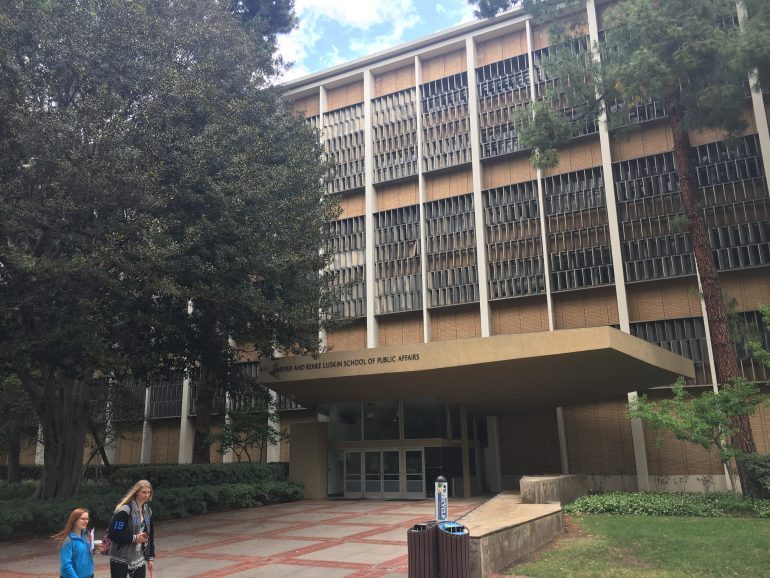Leaders for the union representing graduate student workers on University of California campuses unveiled their “demands” for contract stipulations last month, ahead of negotiations with UC administrators later this year. Buried within the dozen demands made by United Auto Workers Local 2865—which range from fee remission expansion to undocumented student and worker protections—is a seemingly harmless demand for administrators to “Implement Socially Responsible Investment and Financial Practices at UC.”
The single bullet point under this innocuous demand—which on the surface seems perfectly reasonable—reads as follows:
“Develop socially responsible investment/divestment policies and financial policies that prioritize human rights, social development, and environmental protection.”
UAW 2865, which represents UC teaching assistants, graduate student researchers and readers, published the 2018 Bargaining Goals, having polled around a quarter of the system’s academic student Employees. In October, Ha’Am published a piece on the survey, which asked about the respondent’s stated importance of divestiture from private prisons, fossil fuels and “oppression of Palestinians.” It’s no secret that this demand, as included in the “UAW 2865 Initial Bargaining Goals for 2018 Contract Negotiations with UC” refers to a combination of these divestment campaigns.
The implication of expressly calling for divestment, without mentioning Israel, remains to be seen. However, subtle anti-Israel campaigns are hardly a new concept.
Supporters of the Boycott, Divestment and Sanctions (BDS) movement on campus specifically call for an end to investment in companies that work with Israel and its armed forces. Among many valid arguments against campus divestment campaigns, pro-Israel students counter that focus on a single country—arguably the most conscious of human rights in the region—is hypocritical and divisive. The other 99 percent of the campus community wonders why the two can’t just reconcile (or, more likely, are entirely apathetic).
In the seven years or so since campus divestment-from-Israel campaigns became a nationwide trend, proponents have pushed anti-Israel agendas behind the guise of broad concern for corporate accountability and for human rights. While the plight of the Palestinians is certainly a concern (Israel recently restored power to Gazans who now receive 6-8 hours of electricity daily—up from 2-4 over the past six months) resolutions on campus are misleading in preaching a concern for human rights while singling Israel out.
Achieving compromise seems untenable for hardliners on both sides. At my alma mater, UC San Diego, student government leaders tried in vain to broker a compromise resolution that would satisfy pro-BDS goals of calling for divestment and the pro-Israel objective of not singling out Israel. One concern, from the pro-Israel side, is that such an authorizing piece of legislation which divests from “all conflicts and human rights violations” may create a slippery slope which paves the way for subsequent divestment campaigns which focus more specifically on Israel.
This is happening in the real world, too—the City of New Orleans passed a BDS-backed resolution earlier this month to divest from human rights perpetrators, though Israel isn’t mentioned. BDS activists celebrated the passage, as the resolution opened the door for more specific future legislation for the city. The New Orleans bill, like UAW demands, will probably not be the last word on the subject.
In the abstract, nobody who cares about public perception will openly oppose a resolution that simply endorses human rights. The “slippery slope” argument, however, puts Israel advocates in the undesirable position of opposing a human rights bill for its potential implication and not its stated goal. With regard to the UAW 2865 demands, it is possible that negotiations between union heads and the UC administration may never mention the word Israel. But the prospect of a UC agreement in principle to “Develop socially responsible investment/divestment policies” may mean that Israel, by name, appears in the next round of negotiations.
To its credit, UAW 2865’s other 11 demands all have graduate students’ tangible interests in mind. Expanding child care, improving affordability and creating safe, healthy work-study environments all have impacts on campus and are critical for UC leaders to consider. But the questions of the implications of Demand #9, make it hard to immediately endorse the entire list.
The saving grace for pro-Israel advocates has always been the sensibility of system-wide and local administration which routinely disregards and disavows singling out Israel for divestment. But if UC administrators acquiesce to the full slate of demands, including divestment policies, the system could be on the hook to follow through.

